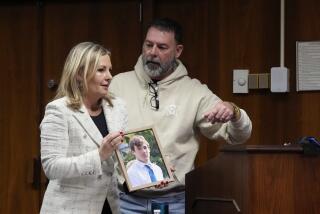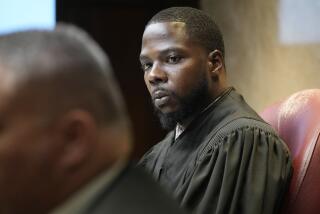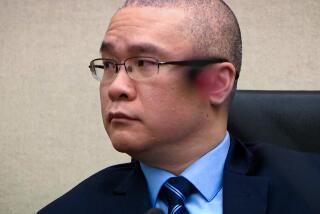1st of 5 Teens in Tay Slaying Gets Maximum : Courts: Charles Choe, 17, will serve only eight years of 25-to-life term because all Youth Authority inmates are released at age 25.
- Share via
ORANGE — One of five teen-agers accused in the brutal New Year’s Eve slaying of honor student Stuart A. Tay has been sentenced and will serve eight years in the California Youth Authority.
Meanwhile, defense attorneys for three of the accused have either challenged or plan to challenge the Tay murder indictments on the grounds that the Orange County Grand Jury lacks racial diversity.
During his sentencing hearing on Thursday, Charles Bae Choe, 17, apologized for his misdeeds and asked to be sent to a private, locked treatment facility in Wyoming rather than jail. He had pleaded guilty to first-degree murder and promised to testify against the others in the case.
But after five hours of emotional pleas by those involved in the case, Presiding Juvenile Court Judge Francisco P. Briseno said the gravity of the crime forced him to order the maximum penalty of 25 years to life in prison. Choe, however, will serve only eight years because the state youth authority releases all prisoners by age 25.
“He had the choice. He could have made the choice and saved Stuart,” Linda Tay, the victim’s mother, said Friday in reaction to the sentence. “Stuart never had a choice. . . . Stuart was our joy, our pride, our future. This is what these guys did--they took everything away.”
Accused in the killing are Sunny Hills High School students Robert Chien-Nan Chan, 18; Abraham Acosta, 16; Mun Bong Kang, 18, and Kirn Young Kim, 17.
In another development in the case, the district attorney’s office has decided not to seek the death penalty against Chan, the alleged ringleader of the crime. Stuart Tay was bludgeoned for 20 minutes with baseball bats and a sledgehammer, then buried in the back yard of Acosta’s Buena Park home.
The four remaining defendants, whose trial is scheduled to begin Sept. 27 in Orange County Superior Court, have filed motions to dismiss special-circumstance charges of “lying in wait” that make them eligible for stiffer penalties, including life in prison without the possibility of parole. Chan’s counsel has also requested that a murder-for-hire charge be dropped.
Ronald G. Brower, Kang’s attorney, presented Superior Court Judge Kathleen E. O’Leary on Friday with a motion to dismiss the grand jury’s indictment of Kang because there are no Asians on the 19-member panel. Kim’s attorney said he would likely join Brower’s motion, while Chan’s attorney said he would probably file a similar, separate motion.
Brower’s motion, which will be heard Aug. 20, contends that the grand jury is discriminatory, considering that only one of 165 grand jurors in the past decade was Asian. The 1990 census showed that Asians make up 10% of Orange County’s population.
The criticism of the grand jury comes days after local Latino groups filed a federal complaint saying the panels have long been dominated by white, middle-class retirees.
Deputy Dist. Atty. Lewis R. Rosenblum brushed aside the threat of the indictments being dropped. If the grand jury’s actions were invalidated, Rosenblum said, he would simply prosecute the case using the preliminary hearing process in which a judge determines whether there is enough evidence to try the accused in Superior Court.
“Anybody hearing this overwhelming evidence would have indicted these defendants,” Rosenblum said. “It just doesn’t make sense to assume that because somebody’s a minority they’re going to not indict someone who is a minority.”
During Thursday’s sentencing, Choe--who police believe did not beat Tay but helped bury him--and his parents begged Briseno for mercy and asked that the young man be given a second chance to lead a productive life.
But Linda Tay also offered powerful testimony, saying her son’s suffering is the last thing she thinks about each night and the first thing every morning.
“The worst part of all this is the helplessness you feel,” she said Friday, vowing to attend the rest of the court proceedings and testify against the defendants at their sentencings.
“It’s like a sapling tree,” Linda Tay said of her son. “You watch it grow, you try to straighten it when it bends, and it’s almost full-grown and here comes a bunch of--what shall I call them?--homicidal maniacs, they just chopped him off at the roots. He never had a chance to grow.”
More to Read
Sign up for Essential California
The most important California stories and recommendations in your inbox every morning.
You may occasionally receive promotional content from the Los Angeles Times.










